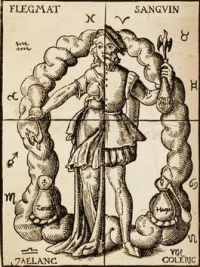Adust
With this word, you may be at one with Google — whenever I searched, Google asked if I meant adjust. No, adust is a distinct word, with no link to adjust. Nor is it linked to dust, though one sense is relevant — it can mean “scorched or burnt”. At one time it could also mean “gloomy or melancholic”. These two very different senses suggest there’s a story to be told.

The four humours, 1574, by Leonhart Thurn-Heisser, a writer on exorcism
The first sense in English, back in the fifteenth century, came via French from the Latin adjective adustus, burnt. That derives from the verb adurere, which is based on urere, to burn, with ad on the front as an intensifier. The Latin verb means “to burn up; consume”. In English, it referred to something that was scorched, seared, dried up with heat or parched. A writer in 1857 referred to certain African islands, “whose desolate and adust beauty sets the imagination all on fire.”
For the other meaning, we have to turn to the medieval medical idea of the four humours of the body — blood, phlegm, choler and black bile. If the humours were kept in reasonable balance the body ran smoothly, but if they became seriously disordered, illness resulted. Excess heat in the body, or heated emotions such as rage, were thought to cause combustion of the humours. This led to the body becoming hot and dry, accompanied by thirst and by a black or burnt colour of the blood. Though any of the humours could be affected, combustion of black bile in particular led to melancholy adust (adjective placed after the noun), in which depression alternated with fits of rage.
The link between adust and melancholy led to adust taking on its other sense of gloomy or depressed, though that died out during the nineteenth century. This is among its last appearances:
His complexion was of the kind which used to be called adust — burnt up with inner fires; his visage was long and somewhat harshly designed, very apt, it would seem, to the expression of bitter ironies or stern resentments.
The Emancipated, by George Gissing, 1890.

